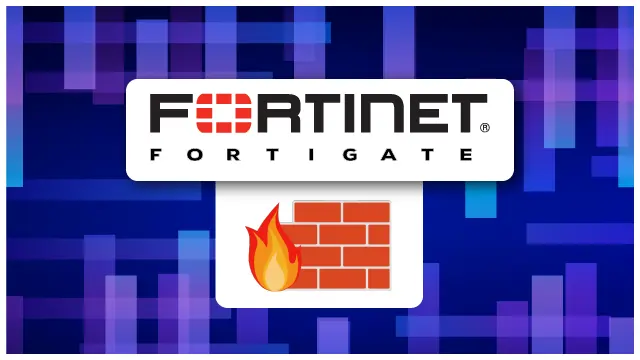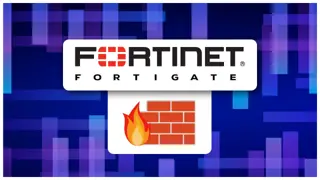
Fortigate | FORTINET Fortigate Firewall with Lab Exercises
Firewall is essential to Network Security. Learn Fortigate Firewall in practice, protect your network from cyber threats
Oak Academy
Summary
- Reed Courses Certificate of Completion - Free
Add to basket or enquire
Overview
Hi there,
Welcome to my " Fortigate | FORTINET Fortigate Firewall with Lab Exercises " course.
Firewall is essential to Network Security. Learn Fortigate Firewall in practice, protect your network from cyber threats
A firewall is a security system designed to prevent unauthorized access into or out of a computer network. Firewalls are often used to make sure internet users without access are not able to interface with private networks, or intranets, connected to the internet.
A firewall is positioned between a network or a computer and a different network, like the internet. It controls the network traffic coming in and going out of the computer or network. If you do not have a firewall, virtually any data can exit your computer or network, and virtually any individual or program can come in.
Certificates
Reed Courses Certificate of Completion
Digital certificate - Included
Will be downloadable when all lectures have been completed.
Curriculum
Course media
Description
Hi there,
Welcome to my " Fortigate | FORTINET Fortigate Firewall with Lab Exercises " course.
Firewall is essential to Network Security. Learn Fortigate Firewall in practice, protect your network from cyber threats
A firewall is a security system designed to prevent unauthorized access into or out of a computer network. Firewalls are often used to make sure internet users without access are not able to interface with private networks, or intranets, connected to the internet.
A firewall is positioned between a network or a computer and a different network, like the internet. It controls the network traffic coming in and going out of the computer or network. If you do not have a firewall, virtually any data can exit your computer or network, and virtually any individual or program can come in.
Basically, a firewall is a cybersecurity solution that protects your computer or network from unwanted traffic coming in or going out. It inspects and authenticates all data packets in network traffic before they are allowed to move to a more secure environment.
Whether a hardware appliance or a software program that is protecting a corporate network or a personal computer, a firewall is essential to network security. For example, depending on where a firewall is installed, it may guard against insider threats in a network segment or act as a barrier against external threats at the network perimeter.
As your organization’s first line of defense, a firewall monitors and filters all network traffic including outgoing traffic, application-layer traffic, online transactions, communications, and connectivity. It blocks incoming threats based on a set of pre-programmed rules that also may dictate which users can access specific network areas.
It protects your network from unauthorized access to mitigate the risk from cyber attacks.
If you really want to learn Firewall Administration and have fun while learning without getting bored, you are at the right place.
With this course, you will learn many things about Firewalls and Firewall Administration and itself. This course offers information from the simplest level to almost advanced. When you finish this course, there will be almost nothing you haven't heard or learned about firewalls.
During the course you will learn the following topics:
What is Firewall?
How Does Firewall Work?
Firewall Working Principle
What is Blacklist / White List / Gray List?
What Firewall Does Not Block?
Network Segmentation Concept
Firewall Types
Firewall Types According to Their Structures
Hardware Firewall
Software Firewall
Firewall Types According to Their Functions
Packet Filtering Firewall
NAT Firewall
Proxy Firewall
WAF Web Application Firewall
UTM (Unified Threat Management)
Firewall Selection
Firewall User Guide and Documents
Network Topology Creation
Installation Files and Setup
Basic Firewall Settings
Firewall Interface
Dashboard
Security Fabric
Fortiview
Network
System
Policy & Objects
Security Profiles
VPN
Firewall Sample Applications
Traffic Shaping
Port Forwarding
Web Filter
Application Control
Intrusion Prevention System (IPS)
With my up-to-date course, you will also have the chance to keep yourself updated and have fun while learning the firewall. I am also happy to say that I will always be available to support your learning and answer your questions.
What Is a Firewall?
A firewall is a network security device that monitors traffic to or from your network. It allows or blocks traffic based on a defined set of security rules.
What does a firewall do?
Basically, a firewall is a cybersecurity solution that protects your computer or network from unwanted traffic coming in or going out. It inspects and authenticates all data packets in network traffic before they are allowed to move to a more secure environment.
Why Do You Need a Firewall?
There are many reasons why you need a firewall but in general, without firewalls, computers and devices in your network are easy targets for cyber attacks.
Firewalls protect your network from unauthorized access by hackers who use a variety of tools to gain entry such as viruses, backdoors, denial-of-service (DoS) attacks, macros, remote logins, phishing emails, social engineering, and spam. You not only need a firewall to block unauthorized access to your network, but also to block your users from visiting inappropriate websites and downloading malware.
You also need a firewall to identify the signatures of dangerous users, known bad actors, and risky applications especially when securing a vulnerable, private network. A firewall can block outflowing data when it notices a social engineering attack to mitigate the damage. When you need to block specific content in application-layer attacks, such as malware, use your firewall. You need a firewall to help you detect and deter rogue activity throughout your network.
Firewalls can also manage network resources so you can control how much network bandwidth is available for specific data types. In addition, you might need a firewall to provide virtual private network (VPN) services that use data encryption to secure communications across the public internet.
By securing the border between your network and the internet, or between segments of your network and the rest of your environment, firewalls provide essential protection from internal and external threats.
What are the Uses of a Firewall in Networking?
The primary use of a firewall in networking is to secure the network from cyberattacks. For example, a firewall prevents malicious and unwanted content from entering your environment. As well, a firewall protects vulnerable systems and private data in the network from unauthorized access–such as hackers or insiders. Protecting your business transitions, operational, and confidential data from ransomware attacks and leaks is a critical use of a firewall.
In educational institutions, for example, network firewalls can be used to limit access to specific websites and content deemed inappropriate or unsafe for a particular organization’s users–such as K - 12 and higher. And in business, a firewall can keep users from being distracted by online advertising, gaming, fraudulent websites that host malware, or certain social media platforms when using the company’s network.
Protecting the seamless operations of a distributed enterprise is a critical use of firewalls in networking. With a remote and often global workforce accessing corporate networks, applications, and data–in multiple data centers around the world–firewalls are imperative to ensure security across all systems.
Firewalls also safeguard supply chain networks to ensure confidentiality and coordination of goods, services, pricing, and production to secure the value for manufacturer, distributor, seller, and consumer. Whether a firewall takes the form of hardware, software, or web application in the cloud–the use of a firewall is essential to secure networking.
Why would you want to take this course?
Our answer is simple: The quality of teaching.
When you enroll, you will feel the OAK Academy`s seasoned developers' expertise.
Video and Audio Production Quality
All our videos are created/produced as high-quality video and audio to provide you the best learning experience.
Now dive into the " Fortigate | FORTINET Fortigate Firewall with Lab Exercises " course.
See you at the course!
Questions and answers
Currently there are no Q&As for this course. Be the first to ask a question.
Reviews
Currently there are no reviews for this course. Be the first to leave a review.
Legal information
This course is advertised on reed.co.uk by the Course Provider, whose terms and conditions apply. Purchases are made directly from the Course Provider, and as such, content and materials are supplied by the Course Provider directly. Reed is acting as agent and not reseller in relation to this course. Reed's only responsibility is to facilitate your payment for the course. It is your responsibility to review and agree to the Course Provider's terms and conditions and satisfy yourself as to the suitability of the course you intend to purchase. Reed will not have any responsibility for the content of the course and/or associated materials.


